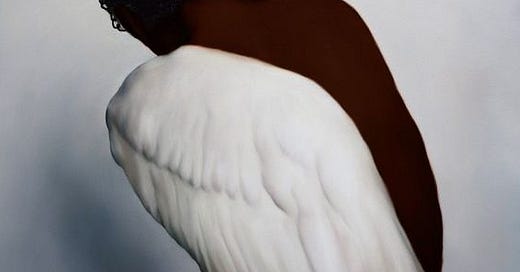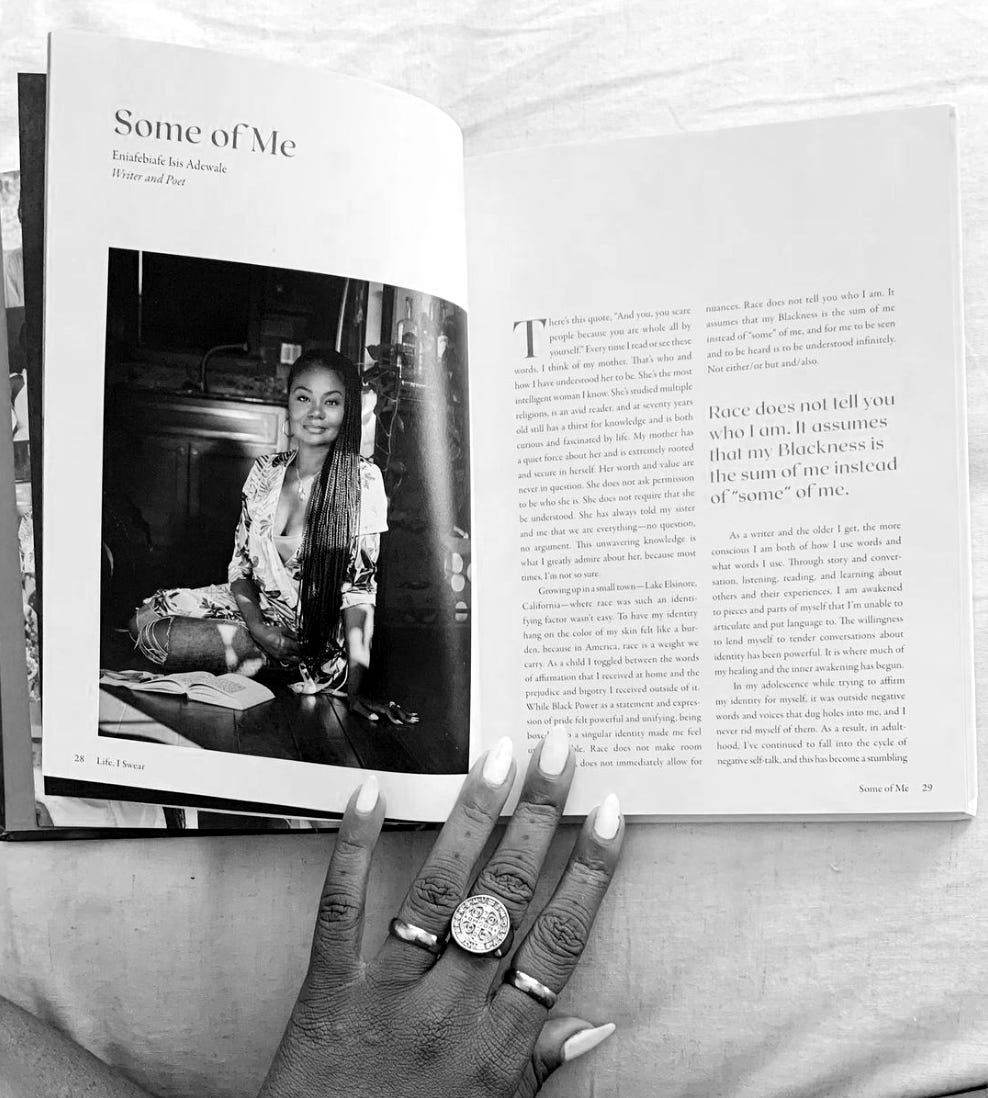I have been on a back-and-forth journey with myself about this piece. I am in a place where I have an abundance of Collected Thoughts and reflections I want to write and share regarding present times, and also I am keenly aware of the truth that there are many, including myself at times, who are looking for an escape from the disgust, heartache, and rage of present realities. But I cannot be an escape.
I am a feeler, and writer who is learning how to alchemize emotion, and heartache, through her pen.
“I am a writer and my faith in the world of art is intense but not irrational or naive. Art invites us to take the journey beyond price, beyond costs into bearing witness to the world as it is and as it should be.
Art invites us to know beauty and to solicit it from even the most tragic of circumstances. Art reminds us that we belong here. And if we serve, we last.”
— Toni Morrison, The Source of Self-Regard, ‘The Price of wealth, the cost of care.’
At face value, one would deduce that I am Black, and while according to America’s racial categories — American Indian or Alaska Native, Asian, Black or African American, Native Hawaiian or Other Pacific Islander, and White — I am Black, this is not all that I am.
My Father is Yoruba, born and raised in Lagos, Nigeria (West Africa). My Mother, in general, would choose not to identify as a race, but in terms of heritage and ancestry she says she is Indigenous, Blackfoot, and African, through the African American experience.
Because my identity is often reduced to race, I have been privy to many unkind, often heinous words, perspectives, and prejudices held by others around me, even those closest to me, that tell the truth of how they feel, and what they believe about me and the nations of people I come from.
“The English language is good for objectification and categorization.”
— Def Sound, Poet and Creative Artist
America, via its language and racial, and class divisions forces reduction.
Since I was a child I felt the weight of America’s objectification and categorization. Growing up in predominantly white environments, I experienced levels of ostracism, bigotry, and discrimination that were beyond the comprehension of my adolescent mind. Despite the vitriol received from adults and children alike, I remained Loving. This I believe to be a testament to my home environment wherein Love1, was fostered and reinforced, in thought, action, and words.
There’s a story my Mother tells about me when I was four or five years old. She had been having conversations with me about my interactions with “strangers”. One day after I’d wondered too far from her line of sight, my Mother found me carrying on a conversation with an older woman, who I did not know. She reiterated the cautionary points of our conversations, “Eni”, she said, “we talked about this. We talked about you not talking to strangers…” to which I replied, “But Mommy, she’s not a stranger. She’s somebodies Mommy.”
In 2020, for one of the first times in my life, I wrote publicly about my own perspective and experience as a Black and African American. I remember my fingers shaking and palms sweating as I fleshed out and stumbled over the words intended to express thoughts and emotions I was still processing. I bid farewell to a friendship as a result of my expressing because what I shared was perceived as a denial of my race and, by relation, my “people”.
“Race, while not a valid biological concept, is a real social construction that gives or denies benefits and privileges. American society developed the notion of race early in its formation to justify its new economic system of capitalism, which depended on the institution of forced labor, especially the enslavement of African peoples.” 2
Race is a construct purposely and intentionally designed to reduce and minimize ones personhood and identity. Race, alone as an identifier, designedly removes from a viewers lens heritage —ancestry and history — culture and experience. Race allows one to believe they know the sum of another, rather than some of another.
Race is a construct that paves and expands runway for the western world and its allies to lay foundation, make and hold claim that one is justified to name one person or group of people as “human” while another or others are “animals”.
In my experience, to be identified through the lens of race, alone, is to be subjected to the narrowest of perspective and perception, ones which then informs how another chooses to see me, speak to me, consider me, judge me, care for or about me, involve me, disregard me, or discriminate against me.
To be identified through the lens of race alone gives permission to those who dictate its constructs to decide what abuses I deserve to be subject to.
To view one through the lens of race alone grants us permission to reduce and abuse another, often in the same ways we have been reduced and have learned, and internalized the reduction of ourselves.
The present and past state of America, America as a nation who has defined itself by its barbarism and eliminationism, has pushed me to continually inspect all the ways in which I have internalized and unconsciously uphold beliefs, perspectives and interests that work against the right to life and livelihood of others and myself. I am compelled to dissect the ways in which I have been taught to be a weapon, to un-see and disregard myself and others around me.
For over a year now the word “complicated” has been thrown around recklessly to describe the history of Israel and Palestine and the origins of the genocide in Gaza. The same “it’s complicated” blanket is being thrown over other regions of the Middle East, Africa and occupied territories of the U.S.
During this time I’ve come to realize how our use of “complicated” provides many with an excuse and a way to remain willfully ignorant, preserving the kind of cognizant dissonance — a psychological state of discomfort or tension that occurs when a person's beliefs or actions conflict with their values — that allows for the continued denial of our role in what is being allowed to take place.
While histories may be complex, they are not complicated. Complicated begs us to dismiss and disregard.
Complexity asks us to study and examine; to give attention and seek understanding.
Misunderstanding — by way of ignoring, allows us the privilege of a disconnected mindset that continues to manipulate us into believing that what is happening to them over there has little or nothing to do with us over here. Further more, this ignorance reinforces the idea that one persons life is worth more than another, and/or that ones right to “peace” or life makes it right to steal away the peace or life of another.
This week I was brought back to words on being and remaining human 3 and I was also reminded of words I’d written about being a Haven In Human Form.
I am still working to put into my words the full breadth and depth of what it means to be human. I think what I am searching for is a boilerplate, dictionary type definition. But this won’t suffice.
Recently, writer and author Zeba Blay re-shared an excerpt from one of her past newsletters. Her perspective on “humanity” is one worth contemplating.
“One's humanity is a fact, like the color of your eyes or the time you were born. One cannot gain or lose one's humanity. Humanity, to me, is not intrinsic empathy or compassion or righteousness. These are things we must all actively choose. Humans can be beautiful and caring and loving to each other but they can also be ugly and cruel and hateful, too. Humanity is not just the best of us, the good in us. Our hideousness towards each other is our humanity, too.”
—
This world that we have been born into, this world that we have inherited was made before we arrived, but we are the continued makers who bear the privilege and responsibility of recreating and reimagining it; seeing beyond the world that we have been handed.
I believe each of us has the mental, spiritual and emotional capacities needed to remain human; to be Havens In Human Form — sanctuary and safety; refuge incapsulated in body.
However, existing for others and ourselves in this manner requires a devout level of mindful awareness, intentional consideration and action.
Being and remaining human requires us to break from taught beliefs, language and behaviors that encourage and condone objectification and categorization.
Existing as havens in human form requires the constant studying of our humanity, and the welcoming of its complexities.
When Nina Simone said, “You can’t help it. An artists duty, as far as I’m concerned, is to reflect the times.” I believe what she was also saying is that to be an artist is to be a willing witness, and to be a witness is, as Bayo Akomolafe phrases, to expand our widthness.
To be an artist is to reflect the truth and imagine and create beyond it.
In the words of Toni Cade Bambara, “Writing is one the ways I participate in my own transformation.”
Writing is one the ways I compel others to participate in transformations of their own, so that we can transform together.
May these words continue to invite us. And may we continue to accept, with open hearts and curious minds, the invitation.
Bell Hooks defines love as "the will to extend oneself for the purpose of nurturing one's own or another's spiritual and emotional growth". She emphasizes that love is a choice, not an expectation, and that it takes daily effort to cultivate. Hooks also states that self-love is the foundation of loving practice.
National Museum of African American History and Culture, ‘Historical Foundations of Race’ https://nmaahc.si.edu/learn/talking-about-race/topics/historical-foundations-race
Transcript:
“I think I would like to say something…I touched on it earlier, about how hard it is, and how necessary it is to become and remain humans. That means a lot. It means not giving in to the comic book version of who we are. Not giving in to all this medieval rhetoric. It means not doing that. We know deep down what’s right, and what’s true, and what’s needed. We gotta get there. We just have to.”
Author Toni Morrison discusses Civil Rights, gentrification, and her book, "Love, A Novel” https://charlierose.com/videos/12477







Always grateful for your thoughtful reflections family.
I'm going to be sitting with this line for a while.
"To be an artist is to reflect the truth and imagine and create beyond it."